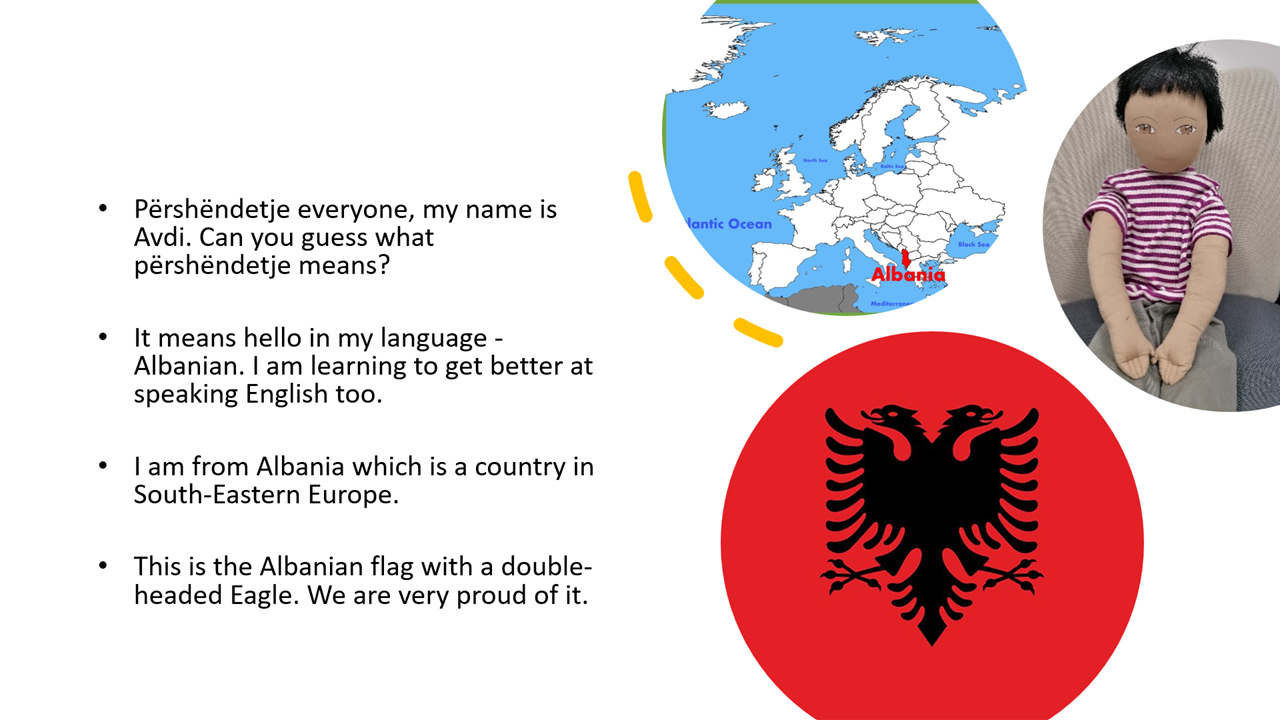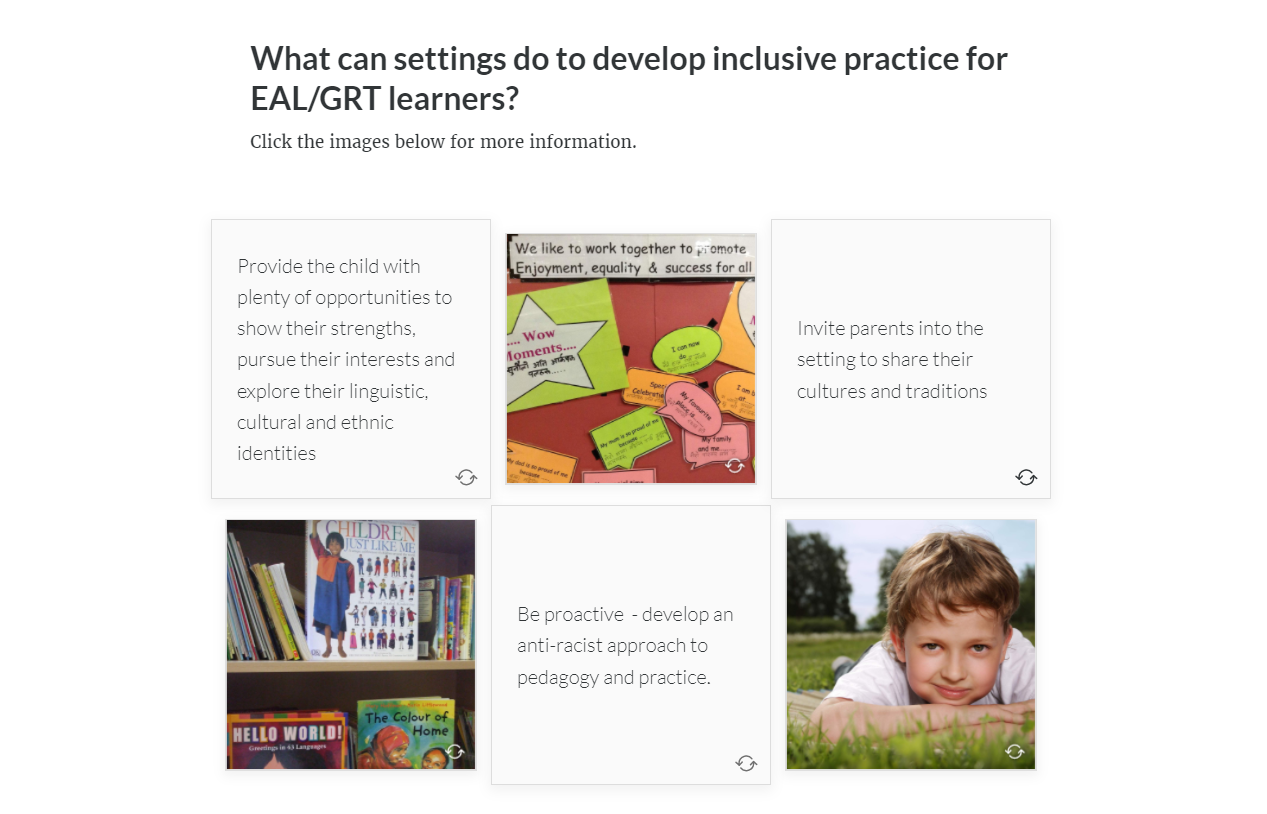Site blog
By Hampshire EMTAS Team Leader Sarah Coles
This blog is about terminology and our understanding of a specific group of children for whom English is an Additional Language: heritage language speakers.

Most practitioners who’ve spent any time at all working with
multilingual learners in schools will be familiar with the concept of the
international new arrival; children who come to the UK from overseas having
been immersed in another language from birth.
Where they are typically developing, these children’s first language
skills will be broadly similar to those of anyone who’s had a monolingual start
in life. Older learners who have been
schooled in their language (L1) in country of origin may have literacy skills
as well as oracy, whilst younger children who’ve not yet started to learn to
read and write may have age-appropriate oracy skills only. Whatever their skills in L1, it is often
shortly after their arrival to the UK that these children embark on the task of
adding English to their repertoire, hence they might be described as ‘sequential
bilinguals’; L1 first, followed by English.
Heritage language speakers are a bit different. The term ‘heritage language speaker’ is used to describe a child growing up in a society where their home language is not the same as the majority language. For example, a heritage language speaker might be a child born in the UK to Polish speaking parents. The main language in use at home might be Polish but outside of the home, they will also have exposure to English, the societally dominant language. For these children, the model of bilingualism is ‘simultaneous’; exposure to both languages from birth (or shortly after). What this means is that whilst such a child might have access to good L1 role models at home, overall their access to Polish is typically less than had they been born and raised in Poland. So they may present with different skills in L1 in comparison with a monolingual Polish-only child.
Many UK-born heritage language speakers have their first experience of being immersed for prolonged periods of time in an all-English environment at pre-school. They will, from that point onwards, rapidly develop their vocabulary in English, alongside the continuing development of L1. However, due to their more limited exposure, it would be expected that their L1 oracy skills might develop more slowly than those of a child born and raised in an essentially monolingual setting, where the main language in use in all social situations is L1.
As they reach school age, heritage language speaking children suddenly experience a dramatic increase in the amount of time they spend in social settings where English is dominant. This typically corresponds with a reduction in access to L1. Whilst in Year R, they may find opportunities to continue to use L1, for example in their spontaneous play with other children who share the heritage language; but in adult-led activities they quickly learn that English is required. Often, it is from the start of school that heritage language speakers’ L1 development plateaus whilst their English comes on in leaps and bounds. There can develop a dichotomy in terms of the words the child knows in their two languages too, with the academic vocabulary known only in English and L1 increasingly beached in informal, home-based contexts. Further, parents often notice that when addressed in L1, their child prefers to respond in English.
Thus from Year R onwards, it takes considerable effort on the part of parents to ensure their child does not lose the heritage language. This is where the Family Language Policy (FLP) comes in. FLPs are important in determining whether or not the heritage language will be successfully transmitted to the child and maintained over time, and comprise the unwritten ‘rules’ around language use in the home. In families where parents continue to use L1 at home, its transmission and maintenance tend to be more successful. But in families where parents gradually abandon L1 in favour of English, which is especially likely in families where one of the parents is a monolingual English speaker themselves, the prognosis is much bleaker. Ceding L1 in favour of English might be prompted by their children’s growing preference for the majority language, but the often unintended consequences can include those same children no longer being able to talk to their grandparents, with the chances of the heritage language surviving to the next generation, their children’s children, reduced to zero.
So what does this matter to practitioners? Well, especially in the Early Years, it is
important that schools work closely with parents if the complete loss of the
heritage language is to be avoided. These
days, ICTs gift us with lots of ways in which we can make space for children’s
L1s in Foundation Stage settings, and it’s really important that practitioners
avail themselves of these. If they do
not overtly value children’s L1s and encourage their use at school, children
will quickly learn to leave their heritage languages at the school door to wait
for home time.
To find out more about ICTs that could be used at school to promote children’s heritage languages, see
Use of ICT (hants.gov.uk)
By Hampshire EMTAS Specialist Teacher Advisor Kate Grant
In this blog, Kate Grant interviews Albanian born Persona Doll Avdi. She asks how practitioners can work with EMTAS Persona Dolls to engage young learners with topics such as diversity, culture and stereotypes.
The Persona Dolls approach affords children an engaging, enjoyable and interactive safe space where they can address challenging issues, share their lived experiences and have their voices heard and valued. It helps our youngest learners to develop their emotional literacy and empowers children to use their voice. The approach is designed to facilitate dialogue around bias and stereotypes which so many of our youngest learners will have already encountered.
If you have used EMTAS Persona Dolls previously you will have noticed that they have been taking a well-deserved rest. After all, it’s not easy visiting lots of schools and making friends all over the county - just ask Avdi! Whilst the dolls have been relaxing, Kate has been working behind the scenes on making the use of EMTAS Persona Dolls in school more accessible, relevant and most of all fun. So without further ado please welcome Avdi to tell us more…
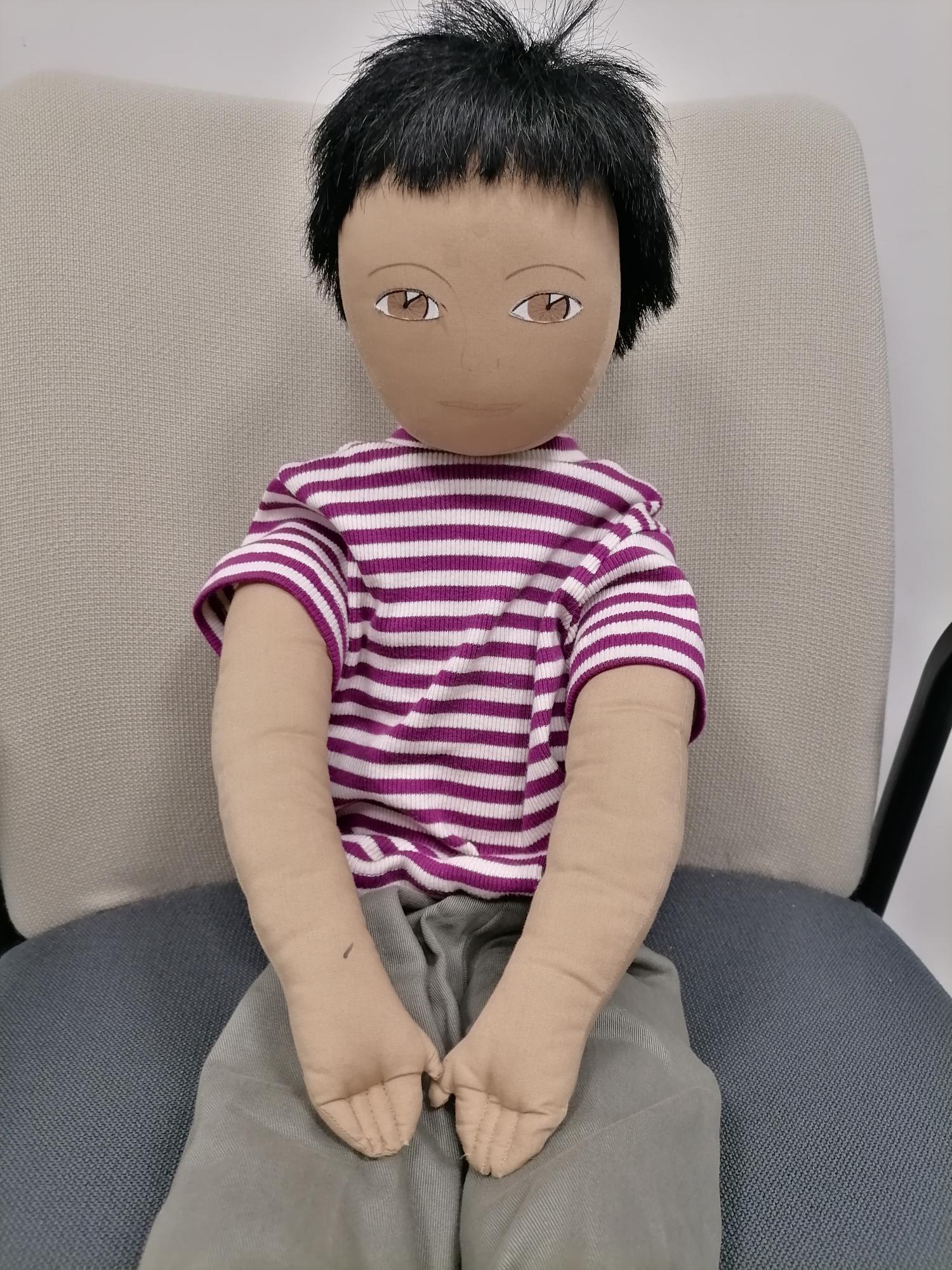
Avdi: Përshëndetje (hello) everyone, my name is Avdi and I am from Albania. Kate has asked me to share with you how working with Persona Dolls can help support your youngest learners in school. This is the perfect topic for me to talk about as I have been a Persona Doll my whole life!
Kate: What do you like about being a Persona Doll?
Avdi: One of the main things I love about being a Persona Doll is that I get to travel around the county, meeting lots of children and learning about different schools. I am always amazed by how warmly the children welcome me into their classroom - they sometimes even give me a school uniform to wear. But most of all, I love hearing the brilliant things children say when I go to visit their school and it often surprises their teachers too as we delve into conversations about issues they might not ordinarily get to discuss such as discrimination and inequality. Big topics for our youngest minds.
Kate: How do you support the children?
Avdi: I find that the children see me as being just like
them. This helps create a safe environment where they are happy to share and
talk about aspects of life they may not normally get to discuss. I think of it as providing children with a
window into someone else’s life, but they often find aspects that mirror their
own too. That’s what life is all about, learning
about yourself and others and embracing the similarities as well as the
differences.
Kate: How will teachers find time to use Persona Dolls?
Avdi: We work within the Early Years Foundation Stage and Key Stage 1/2 curriculum, so we are not an add-on. In fact we’re a different approach to teaching Personal, Social, Emotional Development, Knowledge and Understanding of The World and Relationships and Sex Education. Kate has linked all the relevant parts of the curriculum with our guidance documents so that teachers can see the objectives they can cover whilst working with us. For example you will see we provide an authentic way to approach the People, Culture and Communities element of the Early Years Foundation Stage curriculum [1] and the Respectful Relationships aspect of the Key Stage 1/2 curriculum [2].
Kate: What happens when you visit schools?
Avdi: I normally visit once a week for a half term. When I first go into a school, I explain that I am feeling a bit nervous about being somewhere new with people I don’t know yet, and the children discuss how they could help make me feel more comfortable. It’s lovely to hear how kind the children are and accepting of new people - I wish people were always like this. The next week when I return, I am more confident so I let their teacher share a PowerPoint I have made to tell them a bit more about myself, my home, my language and my interests. The children always want to tell me about themselves too and we find similarities and differences with each other.
By week 3 I am really enjoying being with my new group of friends and I share that something has been worrying me. For example, another child has been unkind to me because my hair is different to theirs. The teacher helps me talk to the children and they respond with so much empathy. A lot of the time, the children tell me they have experienced similar things and we talk about what helped them eg speaking to an adult at school. My new friends always give me good advice, so I go away and try some of their ideas. When I return for my final visit, I feel so much better because they supported me. I explain that I must return to my school again and might not see them, but we will still be friends. I like to surprise them with an e-postcard after my final visit. This shows I am still thinking of them and gives me an opportunity to ask them to write to me about our time together.
Kate: What is different about the way EMTAS Persona Dolls work now?
Avdi: Kate is working on making everything available online because we know how busy teachers are and we want everything to be readily accessible in the moment. Once everything is ready to go, it will all be uploaded to our Moodle where you will find the guidance documents, a list of all our Persona Dolls, suggestions for what to do during each visit and some social stories for teachers.
When I visit your school I will have a lanyard with a QR code so that teachers can find what they need instantly. When teachers share the Persona Doll’s PowerPoint it will contain video links to find out more about the culture and language(s) of the doll’s country of origin together with traditional dances and nursery rhymes in first language.
Kate: Is there anything else you want to tell everyone?
Avdi: Just that I am really excited to get back into schools and to meet lots of new friends. Oh, and if any schools would like to pilot our revamped way of working please email Kate at kate.grant@hants.gov.uk.
[1] Explain some similarities and differences between life in this country and life in other countries
[2] The importance of respecting others, even when they are very different from them (for example, physically, in character, personality or backgrounds), or make different choices or have different preferences or beliefs.
Written by Helen Smith, Lynne Chinnery and Sarah Coles, all of the Hampshire EMTAS Specialist Teacher Advisor team, this blog presents the latest addition to the suite of EMTAS e-learning modules, 'Developing Culturally Inclusive Practice in Early Years Settings'. The new module is aimed at practitioners working in Early Years settings with children and families for whom English is an Additional Language (EAL), or who are from Gypsy, Roma & Traveller (GRT) or Black and Minority Ethnic (BME) backgrounds.

The EYFS Statutory Framework states that “providers have a responsibility to ensure positive attitudes to diversity and difference. Not only so that every child is included and not disadvantaged, but also so that they learn from the earliest age to value diversity in others and grow up making a positive contribution to society”. The themes of inclusion and diversity pinpointed in this statement form the foundation on which the EMTAS Early Years e-learning module sits.
Why Early Years e-learning?
Practitioners in Early Years settings often wonder if what they’re doing for the EAL, GRT and BME children in their care is good practice, as inclusive of the needs of all children and their families as possible. Elsewhere, in settings that don’t have any children from these backgrounds – few and far between these days - work in this area is recognised as equally important. Yet it can be a challenge to find affordable guidance and training to help develop practitioners’ knowledge and understanding of their inclusion brief, without which they may not feel entirely confident when it comes to delivering fully inclusive practice in settings.
There are many questions practitioners might have about their contributions towards the diversity and inclusion agenda. For instance, what advice should they give families whose home language is not English? Should they tell them to carry on speaking their home language(s) to their child or swap to English instead? The answer to this one is that parents/carers should carry on using their strongest language with their child. It really doesn’t matter what that language is; young children can cope with more than one language from an early age and for parents to continue using the home language whilst their child gained exposure to English in an Early Years setting would be one way of raising a child bilingually (there are others). It is also the best way of ensuring that the child develops secure language skills whilst at the same time staying in touch with their cultural and linguistic identity.
For some children, coming into an Early Years setting can bring
many new experiences they have to learn to manage. For GRT children used to an ordered,
uncluttered home environment, the setting might seem chaotic and overwhelming
with its bright colours, numerous toys and messy play. GRT children may have played outside a lot
and may therefore find being indoors sitting still at an activity very
challenging. The e-learning explains
this and other aspects of GRT cultures so that practitioners can grow their
understanding of how best to support GRT children attending their setting.
Other children may come with limited or no experience of being in an English-speaking environment. Accustomed to being spoken to in Urdu or Dari or Polish at home, this can be disconcerting and can result in some children becoming silent in the setting, especially at the beginning – which in turn can be a cause for concern to practitioners and parents alike. The e-learning will help staff better understand things like the ‘silent period’ as well as know what to do to support a child through it.
The term “Black and Minority Ethnic” is more comprehensive and generally encompasses a much broader sweep of children and families, not all of whom will speak another language or have lived in another country. The issues around diversity that staff in settings need to consider in relation to BME children may arise out of language differences, cultural differences, religious differences and/or differences relating to ethnic identity. Images on display in a setting should positively reflect diversity, especially so in settings where the majority population is white. Think also about the books used for story telling; do they include pictures of different kinds of families or of children of different ethnicities? Have you thought about choosing stories that don’t focus on pigs if you work with Muslim families? Or stories that reflect some of the home experiences of your GRT children? If this all seems a bit overwhelming, take heart; the e-learning will help guide you through the diversity maze and empower you to make some carefully considered choices when it comes to provision in your setting.
Towards a more holistic view of the unique child
Cultural and/or language barriers can mask what children are able to do, hiding their interests, skills, abilities and home experiences from staff in settings. Yet it’s really important that practitioners make efforts to find out what children bring with them to the setting. This can help staff better tailor provision so each child receives the best experience from their attendance.
Completing the e-learning will support practitioners to explore and understand what the features of a truly inclusive setting are. This will in turn help them develop their own practice so they give the best start to all their children.
Getting started
Try doing a learning walk around your setting with another member of staff. Ask yourselves if what you see reflects the diversity that exists in the wider world. Do the books you share with children include different languages and images of people from diverse backgrounds? Do you have cooking utensils from other cultural traditions in your home corner? What about the clothing in the dressing-up box?
If you’re not sure where to begin with a learning walk like this, the EMTAS Early Years e-learning can help. It presents guidance and information about a range of issues related to inclusion and diversity using images, short pieces of text and interactive activities like the one shown below.
Screen shot of an interactive activity from the Early Years e-learning module
Included in the module is a checklist practitioners can use to evaluate practice and provision in their setting. It will support you to develop an action plan appropriate to your own children, staff and setting, so any developmental work you undertake will be focused and meaningful, delivering positive change. It also signposts you to further sources of guidance and to resources you might use with children in your setting, many of which are free.
Contact EMTAS to discuss how to gain access to the Early
Years e-learning for staff in your setting.
The price varies according to the number of registrations you need.
Further reading/resources
Free guidance for EYFS from The Bell Foundation:
https://www.bell-foundation.org.uk/app/uploads/2019/01/Guiding-principles-for-EYFS.pdf
Food for thought plus signposting available from Entrust:
Reflecting
on Equality, Diversity and Inclusion in the Early Years | Entrust
(entrust-ed.co.uk)
Suppliers of multicultural books:
Multicultural
Diversity Children's Books - Letterbox Library
Mantra Lingua UK |
Dual language books and bilingual books and resources for bilingual children
and parents and for the multi-lingual classroom.
Free comprehensive guidance pack from Hampshire EMTAS:
Guidance
for Early Years/Year R settings | Hampshire County Council (hants.gov.uk)
Starting school can be a tricky time for any child and their family but for learners of English as an additional language (EAL) it can be a particularly anxious time. In this blog Specialist Teacher Advisor Helen Smith discusses ways to support new EAL learners and help them and their families settle into the school community.

It can be difficult for some EAL parents to understand the equipment that their child needs for school, such as a P.E. kit, book bag and spare clothes. They may also welcome some guidance on what is appropriate and usual to put in a lunch box. Some parents may not be aware that their child needs to be able to dress themselves, take themselves to the toilet, feed themselves etc., and they will need some support with helping their child become more independent with their self-care. Families may also not fully understand the school system. In some countries for instance, children do not progress from one school year to the next without passing exams. Some parents may not be familiar with the concept of learning through play and will need help to understand all the learning that is taking place in a busy Reception classroom. In many counties their child would not be expected to start school until they are 6 or 7 years old. This can make parents feel more unsettled and worried about their child beginning their school journey at a young age.
There are some simple steps that you can take to help your
EAL families feel welcome and more settled. This starts with finding out as much background information as you can.
As
well as the usual new starter information, it will be useful to know about all
the languages spoken in the home. You
will need to ensure names are pronounced correctly and that naming
conventions are understood. It is also important to know if the child was born in the UK or if they’re
a new arrival to the country. If the child is not UK born, try to find out
about the circumstances of their relocation and about their journey – was it
difficult or traumatic? It is also useful to find out if the family is isolated
or if they have strong family and community links.
All this information will help you in putting the right support and resources in place. For example, you may like to share translated or simplified information available on our website. You can also direct parents to the EMTAS phonelines or ask a Bilingual Assistant to help interpret. An effective way to ensure good communication is to hold weekly/half-termly drop-in sessions for EAL parents to discuss any letters or concerns.
Tapping into children’s languages will help EAL learners feel
welcomed and settled in the classroom right from the start. You may consider using
a peer mentoring programme such as the
Young Interpreter Scheme or source multilingual signs and labels as
well as multilingual books and resources. You can also invite speakers of other
languages into your classroom and learn basic words in a child’s first
language. The use of first language should also be encouraged in play and the
rehearsing of speech and writing. Head to our
Moodle to find out how the use of first language as a tool for
learning can support your learners in making solid academic progress.
Another effective tool to help a child transition in school are Persona Dolls. They can be used to introduce a new member of the class and learn about other cultures but also to help children to learn ways to challenge unfairness and discrimination. They help with emotional wellbeing and self-esteem, highlight diversity and commonality and are also a great tool to encourage talk in the classroom. It is important to remember that the doll is a member of your class, not a toy. Persona Dolls can be borrowed from our Resources Centre and training on their effective use is available from EMTAS. Please contact the EMTAS office - EMTAS@hants.gov.uk - if you would like to book a session.
EMTAS Coffee Events revamped
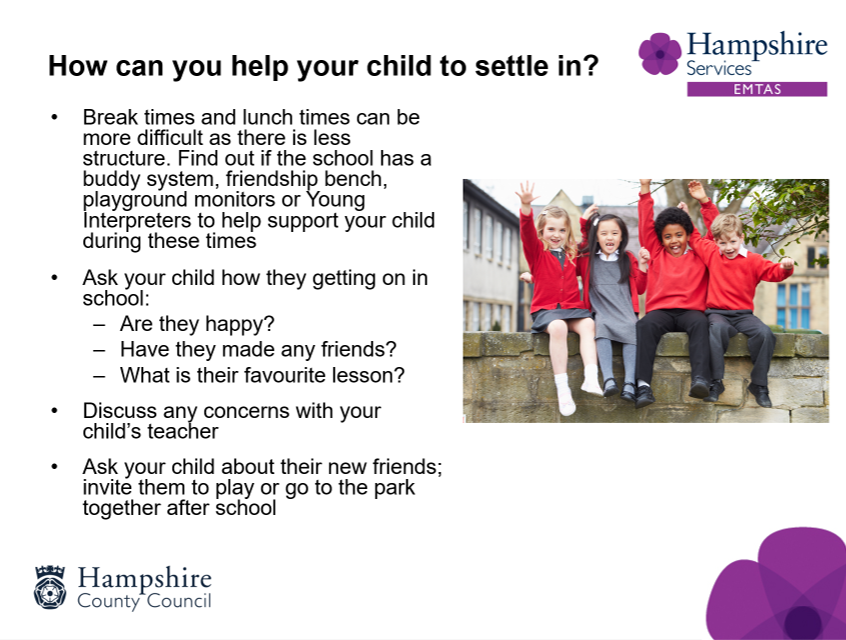
Hosting an EMTAS Coffee Event is another way to help EAL families feel settled and welcome in school. The aim of a coffee event is to provide parents of EAL learners the opportunity to find out a little bit more about the routines and expectations of their children’s school and help them to feel more engaged with their child’s learning and the school community. It is good practice for one or two Bilingual Assistants representing the school’s most prevalent languages to be on hand to interpret as needed.
During the summer term we began a shake-up of our EMTAS Coffee Events programme. After all the lockdowns we felt that a lot of schools and parents would welcome the opportunity to get together face-to-face once again and start building partnerships. The sessions involve a suite of slides that can be adapted to suit the individual needs of the school. To ensure that we cater for all the languages spoken by our families, the coffee events and slides are designed to be simple, visual and informative. Coffee events are interactive and allow the parents ample opportunity to ask questions and voice any concerns or worries. To facilitate this, we have designed the slides to be based around questions, so it is more of a conversation than a presentation. Questions covered in the slides so far include:
What is Hampshire EMTAS?
What does my child need to be able to do for him/herself?
How can you help your child to settle in?
What does my child need to bring to school each day?
What should I put in my child’s lunchbox?
Should my child maintain first language?
How can you support your child’s reading?
What can you do at home to support your child’s learning?
Currently our slides our very Primary based. However we are working with Secondary schools to develop some secondary based slides. If you would like to book a coffee event for your school, you can contact the EMTAS office - EMTAS@hants.gov.uk.
More advice and guidance can be found on our
website. This includes information about making a Year R referral
and how and when to make a Year R transition referral. In addition more ideas
and resources can be found in the guidance library on our
Moodle. If you
would like to improve your EAL practice in Early Years you can also sign up for
our EYFS E-Learning on our Moodle. The course takes you through an introduction
and gives you some starting points and some context about the different
languages that are spoken across Hampshire. There are top tips and help with
assessment and action planning as well as advice on the best use of resources.
Dawn Walters, Year R Team Leader at Hook Infant School, shares the exciting activities she planned as part of a Romany Gypsy Day she organised for her class.
Visit the Gypsy, Roma and Traveller (GRT) pages on the Hampshire EMTAS website.
Subscribe to the Blog Digest (select EMTAS).
In a previous blog, Hampshire EMTAS colleagues Smita Neupane and Sudhir Lama discussed the use of persona dolls in a project aiming to support transition in Early Years and Key Stage 1 with a particular focus on Service children. In this blog, Cherrywood Community Primary School’s EAL Co-ordinator Dawn Tagima shares one year group’s experience of working with Himal.
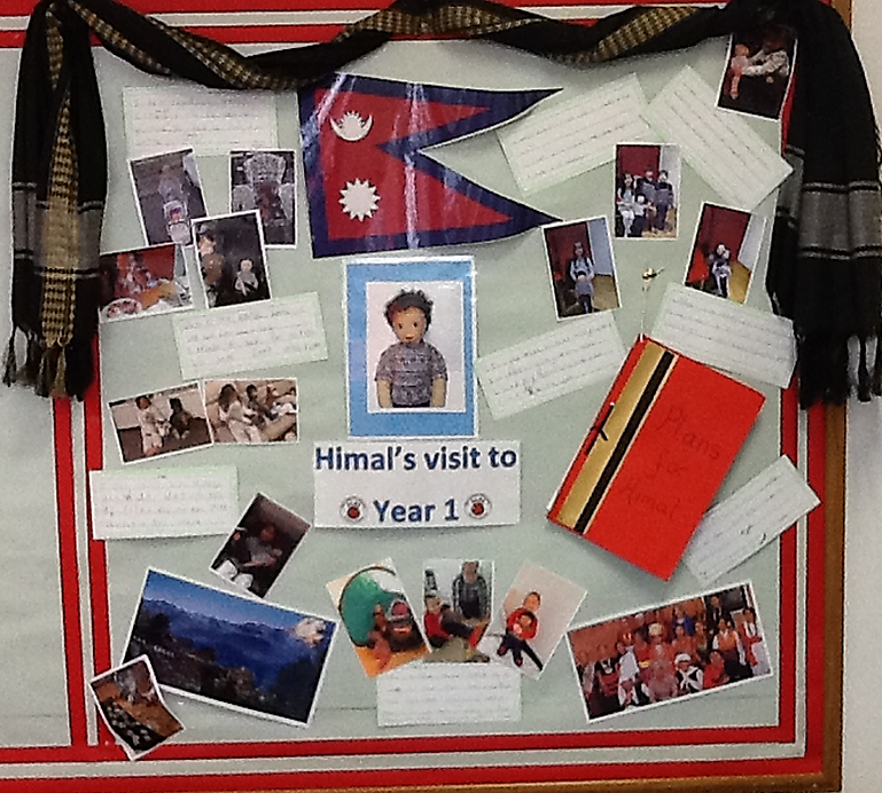
Year 1 children at Cherrywood Community Primary School in Farnborough were delighted to welcome a brand new member to their class, Himal who was from Nepal. Cherrywood Community Primary School has a high number of children with EAL however not many are from a Service background. The school does have experience of working with the local Nepali community and the Year 1 classroom teacher leading this project is herself Nepali. So when the school looked for creative ways to support transition, the persona doll project (and specifically Himal) fitted the bill.
Himal came with his own passport and a 'talking book' which told the children all about his country. The children were told about the fact that Himal was new to this country and how he must be feeling. This encouraged conversations from our children about their own experiences and their own family situations.
Himal was given his own special place to sit in the classroom and the children involved him in every aspect of the school day. They particularly loved sitting and reading to him!
The children made a book about their plans for Himal both in school and at home. Himal was lucky to go home with many of the children to take part in family celebrations and trips out. The children shared this with the class, brought in photos and wrote about it in Himal’s scrapbook.
Himal helped to introduce a brand new topic about feelings and this encouraged the children to produce some amazing work.

Himal has now gone off to another school much to the disappointment of our children but they are always reminded of him with a lovely display in our main hallway and we hope he can come and visit us again when he returns from his 'travels'.
The children gained so much from Himal’s visit. We talked about religious traditions, diversity, beliefs, equality, inclusion, self-esteem, ideas, opinions, sensitivity and pride.
I encourage Early Years and KS1 settings to consider using persona dolls with the children. Simply contact Hampshire EMTAS to discuss the loan of dolls and resources.

